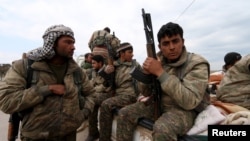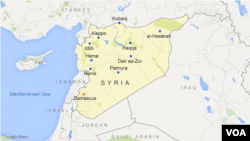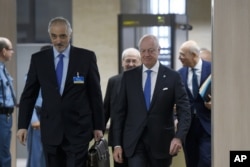Representatives of Syria's largest Kurdish party say they plan to declare an autonomous federal region for the areas they control in the northern part of the country.
Kurdish leaders in Syria said other ethnic and sectarian groups, including Arabs and Turkmen, will be represented in the regional grouping.
However, the United States said Wednesday it will not recognize "self rule" of a semi-autonomous zone in Syria.
"We remain committed to the unity and territorial integrity of Syria," Deputy State Department spokesman Mark Toner said.
Toner said the U.S. remains "focused on advancing a genuine, negotiated political transition towards an inclusive government" in all of Syria.
As Syrian Kurdish militiamen continue to battle other opposition factions in the north of Syria, their political leaders said they are preparing to declare an autonomous federal region.
'Declaration' soon
Idriss Nassan, a top Kurdish foreign affairs representative in the Kurdish-controlled town of Kobani, told Al Jazeera TV that “preparation for the declaration of federalism in north Syria will be soon,” and that Kurdish representatives are now “meeting to discuss the declaration."
Speaking Wednesday from Baghdad, Colonel Steve Warren, the spokesman for the coalition's operation against the Islamic State group, said the announcement was a "political matter" that would not affect operations against IS terrorists.
Syria's ambassador to the U.N., Bashar al-Jaafari, however, told reporters in Geneva that attempts to sow division among the Syrian people would not work.
"The Syrian Kurds are an important component of the Syrian people," he said. "We are proud of them; they are proud of us. We have established our state together for centuries. So, betting on creating any kind of divisions among the Syrians will be a total failure."
Three Kurdish-controlled autonomous regions would unite under the Kurdish plan being reviewed. The Kurdish PYD militia controls large swaths of northern Syria, after defeating Islamic State militants along the Turkish border.
Turkey, however, is not likely to view the autonomy announcement with much enthusiasm, given the low-level conflict between the Turkish government and its own Kurdish citizens, and the recent spate of bomb attacks which Turkey accuses Kurdish groups of perpetrating.
US State Department
A U.S. State Department spokesman Wednesday issued a statement saying, "We have not and will not recognize any "self-rule" semi-autonomous zone" and that, "We remain committed to the unity and territorial integrity of Syria."
Hilal Khashan, who teaches political science at the American University of Beirut, tells VOA that he believes the Kurds' autonomy declaration may aggravate the Turkish-Kurdish conflict.
"Needless to say, this move will mightily anger Ankara and the Turks are bound to respond to it. So, whether it flies or not, it causes an escalation in the situation in Syria. Now, we will have to await the Turkish response to it," said Khashan.
Kurdish political leaders were not invited to the Syria peace talks now taking place in Geneva due to Turkish opposition. Ankara accuses the Syrian-Kurdish PYD party of having ties with the more militant Kurdish PKK, whose leader, Abdullah Ocalan, is imprisoned in Turkey.
VOA State Department correspondent Nike Ching contributed to this report






